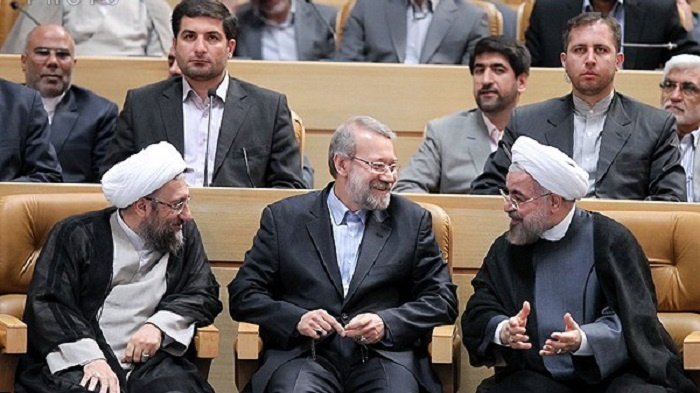Have Reformists Taken Yet Another Big Step toward National Reconciliation?

A reformist campaign that calls for national reconciliation continues to make headlines in Iran. While Shargh Daily reported Saturday that the establishment has given the green to an initiative pursued by Deputy Speaker Ali Motahari to meet leaders of the Green Movement and elicit their plans after a potential release from six-year house arrest, a rumor has also begun to make the rounds: that the release has already taken place in secret.
At the heart of the Reformist campaign lies Iranian Labor News Agency (ILNA) that has published a series of interviews with the country’s senior officials, even though the montage seems to be selective. However, almost every key decision-maker consulted in Iran’s domestic policy has hinted support of the initiative.
Asked by an ILNA reporter, during his weekly presser, to comment on national reconciliation, the Guardian Council spokesman Abasali Kadkhodaei corrected the choice of words to ‘solidarity and national union’, saying respect for the constitution and law as well as obedience to the Supreme Leader’s decrees as the basis for a reconciliation. He added that the Council will act in the same framework and views adherence to law as the best way for unity, solidarity and reconciliation.
In a more ambiguous comment, Judiciary chief Ayatollah Sadegh Amoli Larijani, seen as another side of the dispute, has also told ILNA during rallies on the 38th anniversary of the Islamic Revolution on Friday that national reconciliation would make sense when if there were differences over basic principles, “which we do not have”. During the same rallies, Iran’s secretary of the Supreme National Security Council, rear admiral Ali Shamkhani called the anniversary the symbol of national reconciliation, also in a brief interview with ILNA. Even Mohammad Aliabadi, one of Ahmadinejad’s vice presidents, has told ILNA that the relief of house arrest is part of the mechanism for national reconciliation, stressing that national interests require reconciliation in spite of differences.
In another exclusive interview ILNA published on Saturday, Iran’s Interior Minister Abdolreza Rahmani Fazli said solidarity has always been vital for the establishment and such a need is felt now for the country’s move forward. “The main mechanism to reach national unity lies in obeying the Supreme Leader and following his footstep,” ILNA quoted him as saying.
This rings a bell when hardliner positions on the call for reconciliation is reviewed. On Saturday, ultraconservative daily Kayhan sorely lambasted ‘seditionist betrayers’ who have put forward the threadbare psychological warfare of national reconciliation in order to recoil from accountability over the inefficacies of their coalition administration and failure to realize their promises.
A day before Kayhan, IRGC-affiliated Tasnim News Agency published an interview with Islamic Coalition Party’s central council member Hamidreza Toraghi, in which he criticized President Hassan Rouhani as trying to help seditionists return whereas they have betrayed the people in 2009. Reiterating that the notion of national reconciliation does not suit Iran but conflict-ridden and war-stricken countries such as Syria, Afghanistan, and Iraq, he said people in Iran are not ‘sulking’ to need reconciliation, and the nation, with whatever taste or viewpoint, defends revolutionary principles and ideal unitedly.
Media outlets on both sides of the spectrum in Iran’s political scene are promoting their respective sides’ positions. Calling for national reconciliation and a single voice from the country in the face of foreign threats, even independent daily Ghanoon highlights the campaign as a shot across the enemy’s bows. On the flipside goes Sobhe No daily that shifting from its last week’s unsigned editorial that called the campaign ‘naturally welcome among all political factions’, once again brings up apology from the Reformist camp as a prerequisite for any breakthrough.
Pro-reform analyst Fayaz Zahed told Didban Iran, in an interview published on Saturday, that the Reformists and the Principlists should start talks at different levels. “The Reformists may see the Principlists as reactionaries while the Principlists find the Reformists westernized. If both sides come to the table they may find common ground in many issue while they are different in methods,” Zahed said. Referring to pressure from the Principlists that the first step for such dialogue is on the Reformists who must apologize for their behavior in post-election protests in 2009, which has been the most significant cause of the deadlock, Zahed spoke on behalf of the Reformist camp, saying it is ready for apology if that is what it takes. He concluded his remarks by saying that unprejudiced Principlists would welcome the initiative but the radicals would not stand it. “Rapprochement between the Reformists and Principlists and national talks will increase pressure on the hardliners and threaten their financial interests,” he added.
Although “the apology” may well pave the way for a Reformist comeback in the end, the question that remains to be answered is whether the right will be willing to compromise while still in possession of almost all the country’s appointive centers of power.

